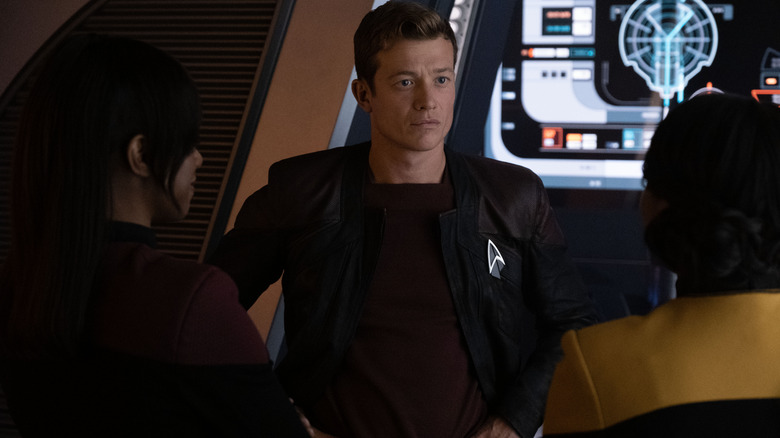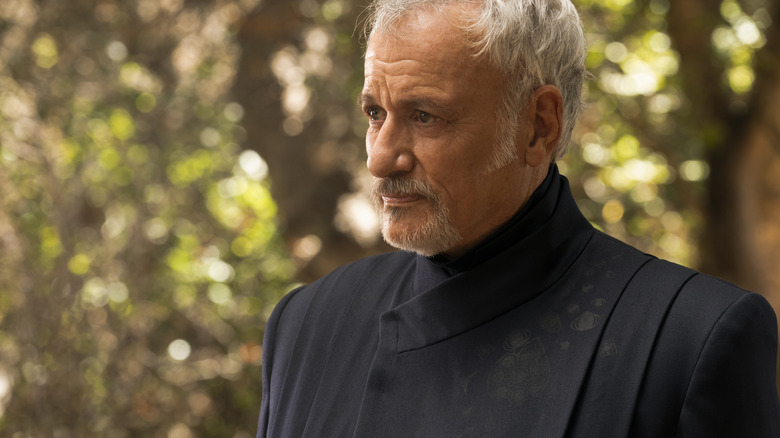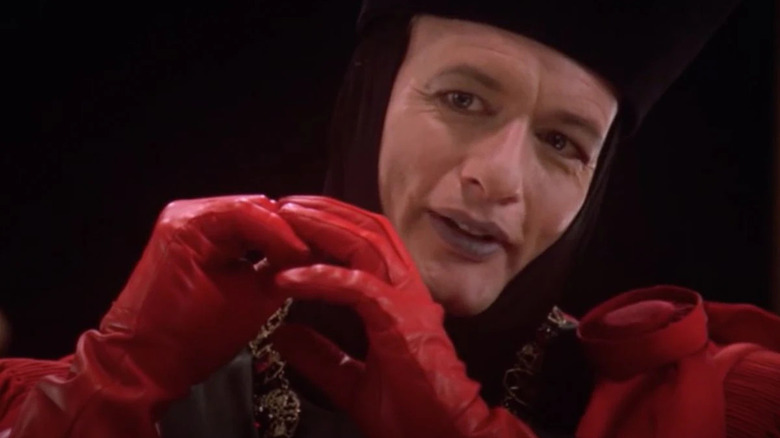Yep, The Picard Finale Has A Credits Scene, And We Need To Talk About It
This post contains spoilers for the series finale of "Star Trek: Picard."
The third season of "Star Trek: Picard" was long ago declared to be its last. Lead actor Patrick Stewart is hanging up his communicator and the cast of "Star Trek: The Next Generation" will finally split up for good. The final season of "Picard" largely served as their encore, a late-in-life reunion that allowed the character to have a few conversations — and to be in utter peril — one last time. It seems the Next Generation is no longer their generation.
Indeed, "Picard" ends with a Next Generation of its own. Flashing forward to a year after the season's climactic Borg battle, a new crew has been assembled. Sidney La Forge (Ashlei Sharp Chestnut), the daughter of Geordi La Forge (LeVar Burton), is already sitting at the helm of the U.S.S. Titan-A. Jack Crusher (Ed Speleers), the son of Jean-Luc Picard (Patrick Stewart) and Dr. Crusher (Gates McFadden), has passed through Starfleet (in only one year!) and will sit as the special counselor to the captain of the Titan. The captain, incidentally, is Seven of Nine (Jeri Ryan) and her first officer will be Raffi (Michelle Hurd), her one-time girlfriend. This is "Star Trek: The Next, Next Generation."
Also, to assure that legacy is on everyone's mind, the U.S.S. Titan is, at the last minute, rechristened the U.S.S. Enterprise-G (it seems that the Enterprise-F was wiped out quickly). Jack will begin his career on the namesake ship of his father's two most famous commands.
With the circumstances so arranged, naturally, the showrunners decided to fold in one last notable guest star to link everything back to NextGen. In a mid-credits scene, the presumed-dead trickster god Q (John de Lancie), alive again, appears to Jack.
The trial never ended
Q died during the finale of the second season of "Star Trek: Picard." So how can he be back to wreak inconvenience on Jack Crusher? Seeing as he is an omnipotent being that lives beyond the normal laws of time and space, there's no reason why he couldn't have lived another several billion years, only to return to the time when Jean-Luc Picard was alive to bid him farewell. He explains to Jack that humans think in linear terms and that his death was not to be taken as permanent.
Jack tells Q that he knows all about his appearances to Jean-Luc, and how Q infamously put humanity on trial for their aggression and brutality. Q first appeared in the "Next Generation" pilot episode "Encounter at Farpoint" (September 28, 1987) dressed as a post-apocalyptic judge in control of his own kangaroo court. In the show's final episode, "All Good Things..." (May 23, 1994), Q declared that the trial never ended and that Picard, through his own witlessness, will accidentally destroy humanity. It wasn't until Picard could understand the real existence of paradoxes that humanity began to show a glimmer of promise. Q withdrew, having proven his point.
Q would return a few times on "Star Trek: Deep Space Nine" and "Star Trek: Voyager," and would close out his story in "Picard," hugging Jean-Luc in a bizarrely sentimental farewell. It seemed that his infinite lifecycle came to an end.
But, as audiences now see, the trial seemingly continues in perpetuity. Q says to Jack that his own trial is just starting. Picard's progeny now bears the responsibility of proving humanity's worthiness to continue existing.
What does it mean?
Audiences have long been trained to accept mid-credits teasers as previews for an upcoming film or TV series; we have the Marvel Cinematic Universe to thank for that. As such, the appearance of Q might serve as a miniature pilot for another new "Star Trek" TV series. Showrunner Terry Matalas has even said that he would love to make a series called "Star Trek: Legacy," which would presumably be about life on the Enterprise-G with a young ensign Crusher and Captain Seven seeking out new life and new civilizations.
With a new Enterprise, a new crew, and a godlike antagonist, it seems that we're exactly back to where we were in 1987 with the launch of "Next Generation." Only this time, a whole season of television presaged it, establishing characters and scenarios the way a pilot episode might. The groundwork has been laid. It seems all Matalas needs is a green light.
As for reusing the "Next Generation" premise of a Picard standing in as humanity's avatar while Q puts our species on trial, I have no problem. Repeating an idea may be cheap from a writerly perspective, but it makes logical sense given Q's nature. He is pretty much immortal, we see, and experiences time on a vast scale. When one can live billions of years, a millennium is but a drop in the bucket. Q knew Picard for, what, five decades? That's not even the single beat of a bumblebee's wing to Q. It makes sense that the trial of humanity would continue into the next generation, or even into multiple generations beyond. Q is the Picard family Devil now.
Whether or not audiences see it happening, we can rest assured that Q will make Picards miserable for thousands of years to come.


